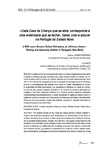«Cada Casa da Criança que se abre, corresponde a uma enfermaria que se fecha». Gerar, criar e educar no Portugal do Estado Novo

Ver/
Use este enlace para citar
http://hdl.handle.net/2183/23515
A non ser que se indique outra cousa, a licenza do ítem descríbese como Atribución-CompartirIgual 4.0 España
Coleccións
Metadatos
Mostrar o rexistro completo do ítemTítulo
«Cada Casa da Criança que se abre, corresponde a uma enfermaria que se fecha». Gerar, criar e educar no Portugal do Estado NovoTítulo(s) alternativo(s)
«With every Nursery School that opens, an infirmary closes». Raising and educating children in Portugal’s New StateData
2018Cita bibliográfica
Gomes Ferreira, A., & Mota, L. (2019). «With every Nursery School that opens, an infirmary closes». Raising and educating children in Portugal’s New State. Sarmiento. Revista Galego-Portuguesa De Historia Da Educación, 22, 133-152. https://doi.org/10.17979/srgphe.2018.22.0.5483
Resumo
[Resumo] A análise centra-se no programa das Casas da Criança enquadrado na obra social
e educativa edificada pela ação, sucessiva, das Juntas Geral do Distrito de Coimbra, da Província
da Beira Litoral e Distrital de Coimbra, lideradas por Fernando Bissaya Barreto, entre
1927 e 1974. Discute-se o programa pelo viés da inovação em educação enquanto introdução
do novo e a reconfiguração das relações com o saber e o poder. Interpelamos um conjunto
multivariado de fontes arquivísticas, e.g., processos de admissão às Casas da Criança,
os livros de atas, plantas e alçados, fotografias e um conjunto de trabalhos elaborados por
estagiárias. Das fontes publicadas destacam-se a imprensa escrita e algumas publicações
contemporâneas dos acontecimentos. O corpus documental foi sujeito ao método crítico e à
análise de conteúdo e recorreu-se à triangulação de fontes para uma leitura mais totalizante.
Obteve-se uma compreensão complexa da realidade educacional, captando dimensões de
inovação educativa e dos seus limites [Abstract] The analysis focuses on the Casas da Criança (Nursery School) program included in the social and educational work developed by the General Board of the District of Coimbra, the Board of the Province of Beira Litoral and the Board of the District of Coimbra, led by Fernando Bissaya Barreto, between 1927 and 1974. The program is discussed from the standpoint of pro-innovation bias in education in terms of the introduction of new ideas and the process of reshaping our relationship with knowledge and power. We address a multivariate set of archival sources, e.g. admission procedures to the Casas da Criança, minutes books, plans and elevations, photographs and a series of studies done by trainees. Noteworthy among the published sources are the printed media and some of the contemporary publications of the events. The documentary works were examined using the critical method and a content analysis. The triangulation of data sources was also used to obtain a more comprehensive reading. A complex understanding of the educational situation was obtained, with insight into the dimensions of educational innovation and its limits.
Palabras chave
Inovação educativa
Casas da criança
Bissaya Barreto
Estado novo
Educação de infância
Educational innovation
Early childhood education
Casas da criança
Bissaya Barreto
Estado novo
Educação de infância
Educational innovation
Early childhood education
Versión do editor
Dereitos
Atribución-CompartirIgual 4.0 España
ISSN
1138-5863






